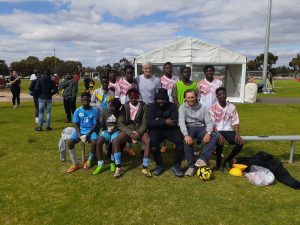Socceroos reflect Australia’s diversity
Australia’s soccer team has always been a reflection of the nation’s waves of migration and the current Socceroos are a case in point.
During the 1960s and 70s the team was made up of mostly first-generation migrants from Europe.
At the 1974 World Cup in West Germany, Australia’s first, the team included migrants from England, Scotland, Germany, and then-Yugoslavia – with Australian-born players a minority.
In 2006, Australia’s ‘golden generation’ – the team that reached the World Cup qualifiers for the first time – included just a single player born outside Australia, New Zealand-born Archie Thompson.
 But the team was made up of the scion of migrant families who played soccer rather than AFL or rugby. And, as such, the team reflected the increasingly diverse demographic make of multicultural Australia.
But the team was made up of the scion of migrant families who played soccer rather than AFL or rugby. And, as such, the team reflected the increasingly diverse demographic make of multicultural Australia.
The current squad, which exited the competition recently after a brave performance against Argentina, is equally diverse. Four players, Awer Mabil, Thomas Deng, Garang Kuol and Keanu Baccus were born in Africa, the first three of them were refugees.
Another is a refugee from Croatia and two more were born in Egypt and Scotland.
Yet others have parents from Serbia, Bosnia, Turkish Cyprus, Romania, South Africa, Germany and the Netherlands.
Striker Awer Mabil was born in 1995 in the United Nations-run Kakuma refugee camp in Kenya after his family fled war in Sudan.
Mabil lived at Kakuma until the age of 10, when his family received asylum in Australia.
Defender Thomas Deng was similarly born in Kenya in 1997 to parents who had fled Sudan and moved to Australia in 2003.
Garang Kuol is the third Australian player with Sudanese heritage. Kuol was born in Egypt to South Sudanese parents in 2004 before moving to Australia with his family at the age of 6.
When Kuol came on in the closing minutes of Australia’s 4-1 loss to France last week, he became the youngest player to represent the Socceroos at a World Cup.
When Australia qualified for the tournament in June, Mabil said the country had given him and his family “a chance at life”.
“On the journey my mum and her parents went through to reach the camp, many people died,” Mabil told media at the time.
“They were captured by the rebels trying to leave. The way they escaped, we could talk about it all night. It sounds like something from a movie, but it’s something they actually went through. The war, the journey, what they faced.
“I feel like ‘Woah’, what people do to keep their kids safe, what they sacrifice to give them a better life. They didn’t know how long they would be in the refugee camp; they thought they would return home. But there’s no returning home,” said Mabil, who will join the English Premier League’s Newcastle United next year.
Mabil, Deng and Kuol have helped put a positive face on Australia’s refugee programs and Mabil understands that obligation.
“I’ve got that title now of ‘refugee kid,” he said in a media interview.
“But I want to tell that story too, inspire people from my country, my mother’s country, around the world.”
Mabil, Deng, and Kuol are also the positive face of their community. Since the 1995 about 30,000 people from South Sudan have come to Australia. The community has produced sports stars, singers, models lawyers but it has also been demonised by cynical politicians linking it with gang crime and thus subject to racism.
Former Socceroo captain and human rights advocate Craig Foster was guest of honour at a recent multicultural football tournament in Mildura, 550 kilometres north-west of Melbourne and a thousand kilometres from his home in Sydney.
Looking out on pitches filled with migrant players from 20 different countries, he reflected that soccer was the perfect metaphor for equity and diversity.
“There are rules in the game that apply to everyone no matter who they are or where they come from,” he says.
“I think you can see something similar to a human rights framework in the game of football. Here is the pitch and here are the regulations we have agreed to.
“And I think sport can be a powerful tool for us to promote respect and equity and it is powerful agent for social change,” he said.
“Tournaments like these bring us together. What we see here is a true reflection of what Australia is,” Foster said.












